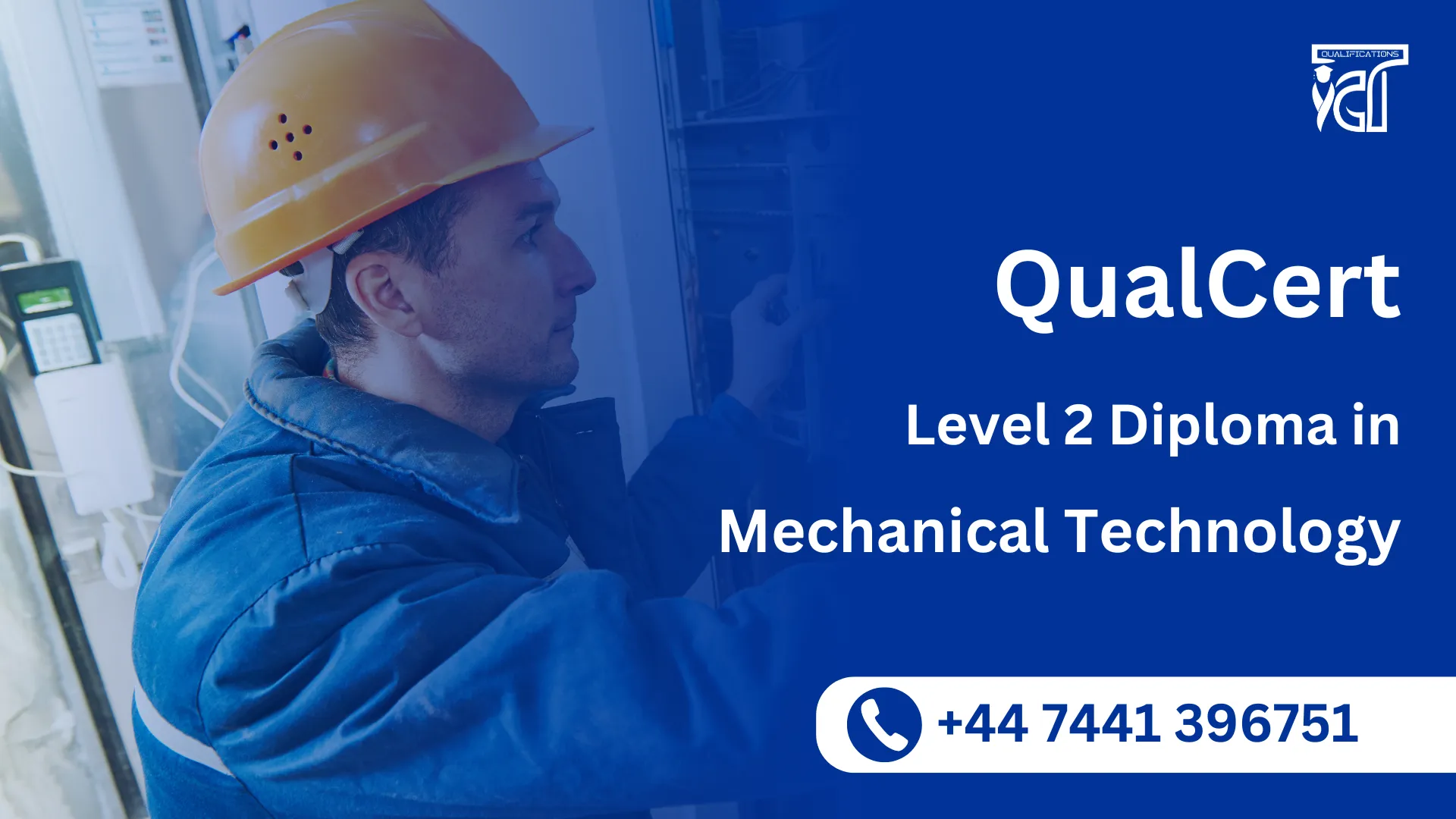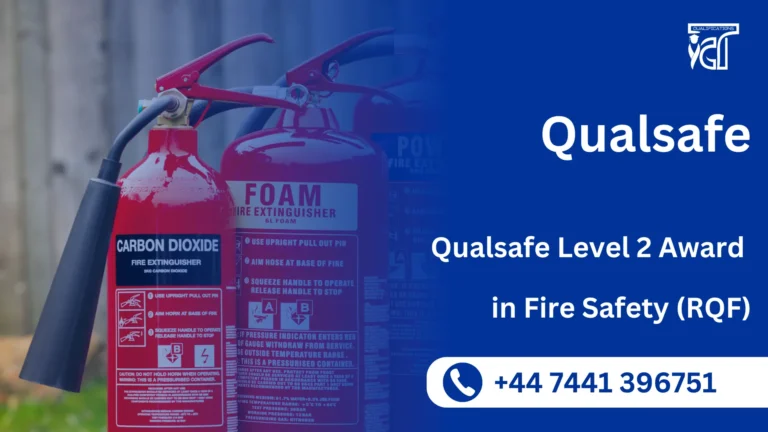In an era defined by industrial growth and technological innovation, mechanical engineering remains at the core of many sectors, including manufacturing, construction, and energy. For individuals looking to enter this dynamic field, the QualCert Level 2 Diploma in Mechanical Technology provides the essential foundation. Designed to introduce learners to key mechanical principles and hands-on technical skills, this qualification is the ideal starting point for a successful career in engineering.
The QualCert Level 2 Diploma in Mechanical Technology is a nationally recognized vocational qualification aimed at equipping learners with core skills in mechanical engineering. Developed by QualCert, a respected awarding organization for technical and vocational training, this diploma offers both theoretical understanding and practical experience in mechanical systems and engineering processes.
This diploma offers an excellent starting point for individuals with little to no prior experience in mechanical engineering. It bridges the gap between general education and vocational expertise.Through practical workshops and assessments, learners acquire technical proficiency in machining, assembling, and maintaining mechanical systems—skills highly valued by employers.
The QualCert Level 2 Diploma in Mechanical Technology is delivered by a range of approved training providers, colleges, and private institutions across the UK. Many offer flexible study options, making it easier for learners to balance training with work or personal commitments.
Prospective students are advised to verify the provider’s accreditation status and ensure they offer suitable facilities for hands-on training.
The QualCert Level 2 Diploma in Mechanical Technology lays the groundwork for a promising career in mechanical engineering. With its focus on practical skill-building, industry relevance, and academic progression, this qualification stands out as a trusted and valuable credential for future technicians and engineers.
Whether you’re just starting out or looking to solidify your knowledge base, this diploma offers a clear and accessible route into one of the world’s most essential industries.
QualCert Level 2 Diploma in Mechanical Technology
The QualCert Level 2 Diploma in Mechanical Technology is a 30 credits qualification with a Total Qualification Time (TQT) of 300 hours, including 150 Guided Learning Hours (GLH). This course is thoughtfully designed to provide targeted and efficient skill development in the field of Mechanical, offering learners a solid foundation to build their expertise.
| Unit Ref# | Unit Title | Credit | GLH | TQT |
| QC03002 – 1 | Advanced Mechanical Drawing & CAD | 5 | 25 | 50 |
| QC03002 – 2 | Fluid Mechanics & Hydraulics | 5 | 25 | 50 |
| QC03002 – 3 | Strength of Materials & Structural Analysis | 5 | 25 | 50 |
| QC03002 – 4 | Engineering Mathematics II | 5 | 25 | 50 |
| QC03002 – 5 | Control Systems & Automation | 5 | 25 | 50 |
| QC03002 – 6 | Thermodynamics & Heat Transfer | 5 | 25 | 50 |
GLH (Guided Learning Hours) and TQT (Total Qualification Time) are terms commonly used in vocational qualifications to help define the amount of time a learner is expected to spend on their studies.
1. GLH (Guided Learning Hours)
GLH refers to the number of hours a learner spends being directly taught, supervised, or supported during their course. This includes the time spent in activities such as:
- Classroom instruction
- Practical workshops
- One-on-one tutoring or mentoring sessions
- Online learning sessions with tutor support
In other words, GLH represents the time that learners are actively engaged with their instructors or learning activities.
2. TQT (Total Qualification Time)
TQT represents the total amount of time a learner is expected to invest in completing a qualification, including:
- GLH (Guided Learning Hours): Time spent on direct learning, as explained above.
- Self-Directed Learning: This includes time spent on independent study, research, assignment completion, preparation for exams, and any other work the learner does outside of direct teaching hours.
TQT is a broader measure that includes all the time required to achieve the qualification. It helps learners and employers understand the overall commitment required for the qualification.
Key Differences Between GLH and TQT:
- GLH focuses on direct learning with guidance or supervision.
- TQT includes GLH as well as independent study time and other learning-related activities.
Example:
If a qualification has a TQT of 600 hours and a GLH of 250 hours, it means the learner should spend 250 hours in direct learning (classroom, online, or tutor-led sessions) and 350 hours on independent study or research.
Upon successful completion of the QualCert Level 2 Diploma in Mechanical Technology, students will have:
Advanced Mechanical Drawing & CAD
- Gain proficiency in creating advanced mechanical drawings using industry-standard CAD software.
- Develop the ability to produce 2D and 3D technical drawings for complex mechanical components and assemblies.
- Learn to interpret and analyze engineering drawings, ensuring they meet industry standards and specifications.
- Understand the principles of geometric dimensioning and tolerancing (GD&T) for accurate design representation.
- Apply CAD tools for the design, modification, and optimization of mechanical systems.
Fluid Mechanics & Hydraulics
- Understand the fundamental principles of fluid mechanics and their application to real-world systems.
- Develop the ability to analyze fluid flow, pressure, and velocity in pipes, channels, and open systems.
- Learn the theory and practical applications of hydraulic systems, including pumps, valves, and actuators.
- Gain knowledge in fluid statics, dynamics, and the behavior of fluids under various conditions.
- Solve problems related to fluid flow and hydraulic circuit design, ensuring efficient system operation.
Strength of Materials & Structural Analysis
- Understand the concepts of stress, strain, and deformation in materials under various loading conditions.
- Analyze the mechanical properties of materials and their behavior under tension, compression, bending, and torsion.
- Develop the ability to perform structural analysis on beams, frames, and trusses, applying principles of equilibrium and material strength.
- Apply the theories of elasticity and plasticity to predict material failure and optimize designs.
- Learn to calculate safety factors and assess the load-bearing capacity of structures.
Engineering Mathematics II
- Build on mathematical concepts from earlier courses to solve complex engineering problems.
- Apply advanced calculus, differential equations, and linear algebra to mechanical engineering contexts.
- Develop proficiency in solving problems related to dynamic systems, vibrations, and oscillations.
- Understand the mathematical modeling of engineering systems and use these models for analysis and design.
- Gain the skills necessary to apply numerical methods and computational tools for engineering calculations.
Control Systems & Automation
- Understand the principles of control systems, including open-loop and closed-loop feedback control.
- Develop the ability to model dynamic systems and analyze their stability and response.
- Gain knowledge of automation technologies, including sensors, actuators, and control algorithms.
- Apply control theory to the design and optimization of mechanical systems for precise operation and efficiency.
- Learn to use modern software tools for simulating and designing control systems and automated processes.
Thermodynamics & Heat Transfer
- Understand the laws of thermodynamics and their application to mechanical systems.
- Analyze energy conversion processes, including work, heat, and power generation in mechanical systems.
- Develop the ability to perform heat transfer calculations, including conduction, convection, and radiation.
- Apply thermodynamic principles to optimize system efficiency and performance in heat exchangers, engines, and refrigeration systems.
- Learn to design thermal systems that minimize energy loss and maximize performance in various applications.
Benefits of the QualCert Level 2 Diploma in Mechanical Technology
1. Strong Foundation in Mechanical Engineering
This diploma provides a comprehensive introduction to mechanical principles, tools, and practices, making it ideal for beginners or those transitioning into engineering from another field.
2. Hands-On, Practical Skills Development
Learners gain direct experience with engineering tools, machinery, and mechanical systems. This practical, skills-based training prepares individuals to handle real-world technical tasks with confidence.
3. Nationally Recognized Qualification
The QualCert Level 2 Diploma is an accredited qualification, recognized across the UK and aligned with national vocational standards, enhancing both employability and academic credibility.
4. Pathway to Further Education and Career Growth
Upon completion, learners can progress to the Level 3 Diploma in Mechanical Technology or similar advanced qualifications, supporting long-term career development in mechanical or manufacturing engineering.
5. Improved Job Prospects
This course equips learners with job-ready skills suitable for entry-level positions such as:
- Mechanical Engineering Operative
- Maintenance Assistant
- Workshop Technician
- Machine Operator
Employers value candidates with practical training and safety awareness, both of which are emphasized in this diploma.
6. Comprehensive Health & Safety Training
The program includes essential training on workplace health, safety, and environmental procedures, helping learners meet legal standards and contribute to a safer work environment.
7. Accessible Entry Point
No extensive prior experience is required, making this course an excellent option for school leavers, career changers, and adult learners entering the mechanical or engineering trades.
8. Blended Learning and Flexible Delivery
Many training providers offer flexible learning formats, including classroom, blended, and work-based learning, to accommodate different learning styles and schedules.
9. Industry-Relevant Curriculum
All modules are designed with input from engineering employers to ensure learners are trained in current technologies and practices used in today’s mechanical engineering workplaces.
10. Confidence and Competence in Technical Environments
By the end of the program, learners gain not just technical knowledge, but the confidence to apply their skills in practical settings—an essential trait for success in engineering roles.
The “QualCert Level 2 Diploma in Mechanical Technology” is tailored for a diverse group of individuals who are determined to take their understanding of mechanical engineering and technology to the next level. This course is ideally suited for:
- Level 1 Diploma Graduates: If you have successfully completed the Level 1 Diploma in Mechanical Technology, this course represents a logical and enriching progression in your educational journey. It allows you to deepen your knowledge and enhance your practical skills.
- Engineering Enthusiasts and Career Changers: Individuals who possess a passion for the inner workings of machinery and a strong desire to explore the intricacies of mechanical technology will find this course a compelling path to enter the dynamic world of mechanical engineering.
- Technicians and Entry-Level Professionals: For those who are currently working in entry-level positions within the field of mechanical engineering and aspire to climb the career ladder, this diploma provides an opportunity to gain advanced expertise and qualifications.
- Academic Advancers: Students with a foundation in mechanical engineering or a related discipline who wish to pursue advanced studies and specialization in this field will find this course a stepping stone toward achieving their academic goals.
- Innovators and Problem Solvers: Those with a natural aptitude for creative problem-solving and a keen interest in designing mechanical systems will benefit from the advanced knowledge and skills this course offers, enabling them to contribute to cutting-edge innovations.
Entry Requirements
Register Now
Qualification Process
Qualification Process for the QualCert Level 2 Diploma in Mechanical Technology
- Self-Assessment:
Begin by evaluating your eligibility to ensure you meet the qualification requirements, including work experience, knowledge, and language proficiency. - Registration:
Complete your registration by submitting the required documents, including a scanned copy of a valid ID, and paying the registration fee. - Induction:
An assessor will conduct an induction to confirm your eligibility for the course and explain the evidence requirements. If you do not meet the criteria, your registration will be canceled, and the fee will be refunded. - Assignmnets & Evidence Submission:
Provide all assignmnets and the necessary evidence based on the assessment criteria outlined in the course. If you are unsure of the required evidence, consult with the assessor for guidance on the type and nature of evidence needed. - Feedback and Revision:
The assessor will review your submitted evidence and provide feedback. Evidence that meets the criteria will be marked as “Criteria Met,” while any gaps will be identified. You will be asked to revise and resubmit if needed. - Competence Evidence:
Submit final evidence demonstrating that all learning outcomes have been met. This evidence will be marked as “Criteria Met” by the assessor once it is satisfactory. - Internal Quality Assurance (IQA):
The Internal Quality Assurance Verifier (IQA) will review your evidence to ensure consistency, quality, and compliance with standards. - External Verification:
The IQA will submit your portfolio to QualCert External Quality Assurance Verifiers (EQA) for final confirmation. The EQA may contact you directly to verify the authenticity of your evidence. - Certification:
Upon successful completion of all checks, QualCert will issue your official certificate, confirming that you have attained the QualCert Level 2 Diploma in Mechanical Technology.







